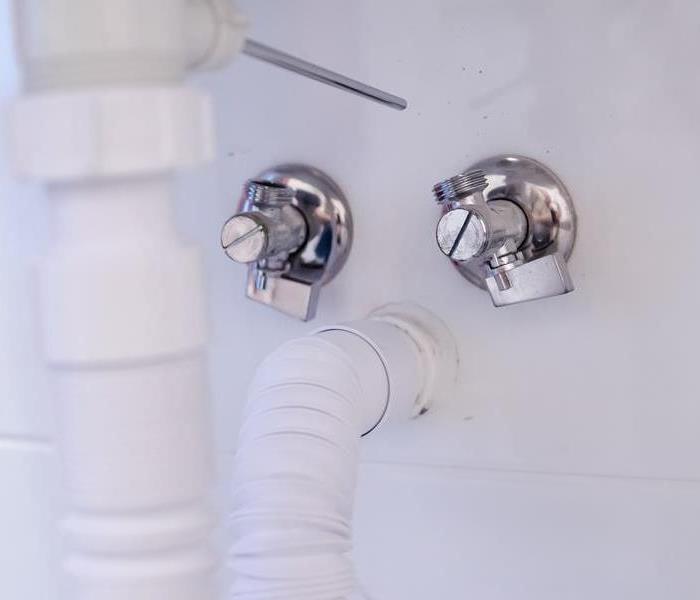Archived Water Damage Blog Posts
Uncovering the Hazards of Hidden Water Damage with SERVPRO® of Greenville
4/13/2023 (Permalink)
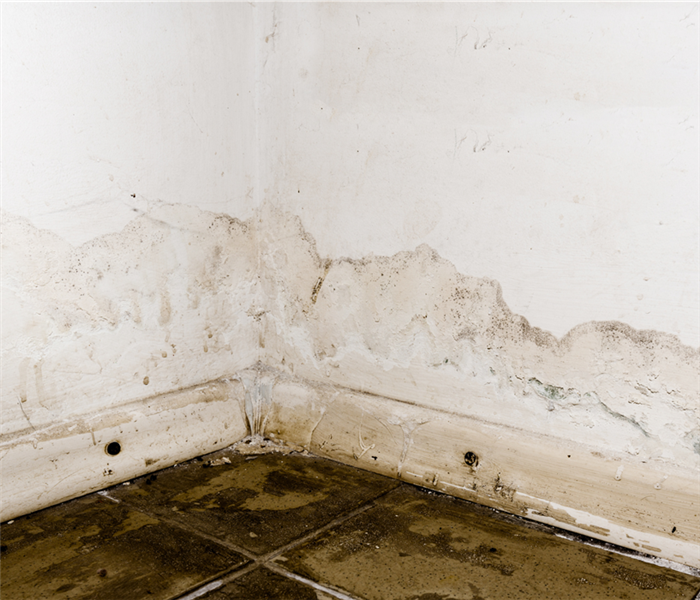 If you notice any signs of hidden water damage, call us right away!
If you notice any signs of hidden water damage, call us right away!
Water damage is a common problem faced by homeowners and businesses in Greenville. While visible water damage can be easily identified and addressed, hidden water damage is a more insidious issue that can lead to significant problems if left untreated. Here, we'll look at how to detect it, and how SERVPRO® of Greenville can help restore your property back to preloss conditions.
The Dangers of Hidden Water Damage:
- Structural damage: When water seeps into walls, floors, and ceilings, it can weaken the structural integrity of the building, causing it to become unstable and even collapse.
- Mold growth: Hidden water damage can create the perfect conditions for mold growth. Mold can cause health effects and further damage to the property.
- Electrical hazards: Water and electricity are a dangerous combination. Water damage can cause electrical shorts and fires, posing a serious risk to occupants and the property.
- Decreased property value: Undetected water damage can lead to costly repairs and lower the value of your property.
Detecting Hidden Water Damage:
- Unusual odors: Musty smells can be an indication of hidden water damage and mold growth.
- Discoloration and staining: Water stains or discoloration on walls, ceilings, or floors can signal a hidden water leak.
- Warped or buckled materials: Swollen or warped materials, like baseboards, drywall, or flooring, may indicate the presence of moisture.
- Increased utility bills: A sudden spike in your water bill could be a sign of a hidden leak.
How SERVPRO® of Greenville Can Help: At SERVPRO® of Greenville, our highly trained professionals have the expertise and equipment to identify and address hidden water damage. Our services include:
- Leak detection: Our team uses advanced technology to locate and diagnose hidden water leaks.
- Water damage restoration: We provide comprehensive water damage restoration services, including water extraction, drying, dehumidification, and cleaning.
- Mold remediation: Our team is skilled in mold detection and remediation, helping give you peace of mind.
- Structural repairs: We can repair or replace damaged materials to restore your property to its preloss condition.
Don't let hidden water damage compromise the safety and value of your property. If you suspect a problem, contact SERVPRO® of Greenville for a thorough inspection and professional restoration services. We're available 24/7 and are "Here to help®" when you need us most.
How Restoration Experts at SERVPRO® of Greenville Handle Water Damage
9/19/2022 (Permalink)
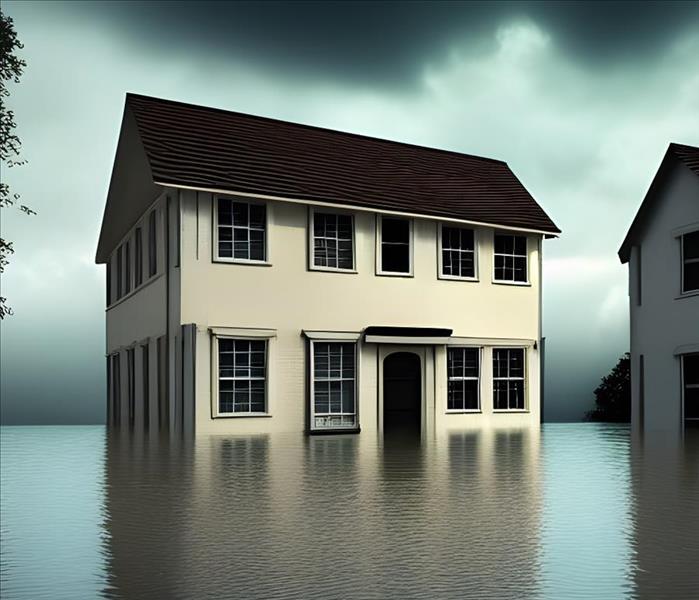 Water damage can be devastating, but restoring your home afterward shouldn't be. Call SERVPRO® of Greenville to take care of your home or business.
Water damage can be devastating, but restoring your home afterward shouldn't be. Call SERVPRO® of Greenville to take care of your home or business.
Water damage is different from other disasters because it is unpredictable. With natural disasters, you only have to deal with the unpredictability of outside forces. But with water damage, you never know when a flood could occur, when a pipe might burst inside your wall, or when a supply line running to your refrigerator could fail. Two sets of variables can double the frustration.
If you are one of the 14,000 unfortunate homeowners who will deal with water damage today, take a deep breath and click the help link at the bottom. Here's how SERVPRO can handle your water emergency:
Emergency Contact: Rest easy; you’ve already got an expert on the line. Just answer a few questions to help us understand what’s going on, and we’ll set a time to get on site.
Inspection and Water Damage Assessment: The next step is getting boots on your property and eyes on the damage. We’ll get a feel and put a plan together, and we’ll make you aware of any potential perils stemming from the damage.
Water Removal: Your SERVPRO team brings knowledge to the table and pumps to the scene, and we’ll use them both to get rid of the offensive water that’s got your life upside down. You’ll lose count of how many gallons we’re able to extract.
Damaged Material Removal: Restoration is our priority, but some things may not be able to be saved. We’ll carry those things off and leave the rest of the space in a better situation to get dry.
Cleaning, Sanitizing, and Deodorization: Water that invades your home can stain, sour and flat-out stink. We’ve got customized cleaners and techniques to get rid of all of it.
Drying: Our next big priority is getting the place dried out before mold decides on becoming an unwanted roommate. We’ll use specialized HEPA vacuums and other equipment to strip every surface of excess dampness.
Monitoring: What we start, we’ll manage. Every day you’ll be seeing and hearing from us on the status of the restoration, and if adjustments need to be made, we’ll be right there on top of things.
Repairs and Construction: Now for our last trick, we’ll make your home look Like It Never Even Happened®. We’ll go to whatever lengths are necessary to repair, restore or reconstruct your damaged areas so that you’ll barely even remember we came when we're finished.
Give us a call for all of your restoration and remediation needs at 252-329-7205.
Excess Moisture in The Air Can Damage Your Greenville, NC Home.
9/9/2022 (Permalink)
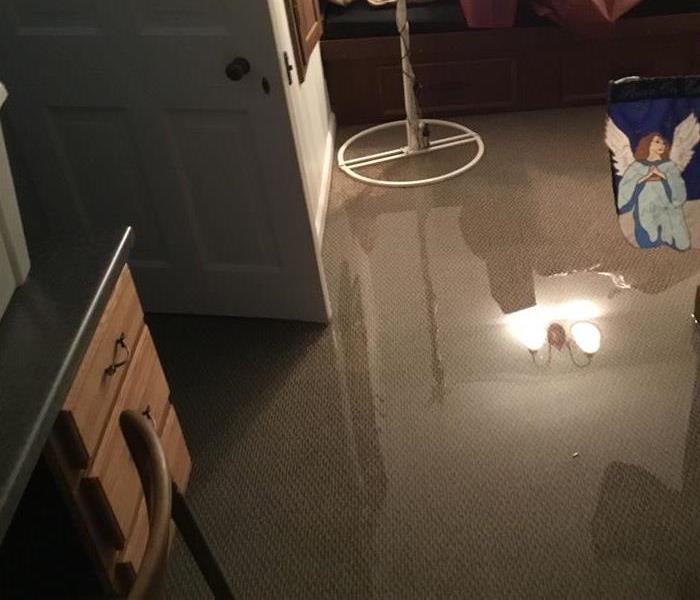 Toilets, dishwashers, and refrigerators are all fairly common sources of water damage. Be sure to inspect them regularly!
Toilets, dishwashers, and refrigerators are all fairly common sources of water damage. Be sure to inspect them regularly!
Even if your home has never been flooded, excess moisture may still be wearing down its materials and creating ever-costlier damage to your property. A significant proportion of SERVPRO's water removal requests are for more moderate, subtle examples of water and moisture wreaking havoc in a home. Cases like these are some of the most common water removal projects we take on:
Excess Humidity
When a home's atmosphere is too humid because of excess water intrusion, airborne water droplets can start to cause damage to metals, wood, certain finishes, fabrics, and other materials common in American homes. Long periods of exposure to humid conditions can encourage mold growth in fabrics and building materials. During standard water remediation techniques, we remove standing water first by pumping and extracting, then reduce the relative humidity in the air and the moisture content of materials by deploying air movers and dehumidifiers. This dehumidification process also improves overall indoor air quality (IAQ). SERVPRO offers various types of equipment such as low grain refrigerant (LGR) and silica gel-based (desiccant) dehumidifiers.
Appliance Malfunctions
Even the most stalwart appliances can malfunction on occasion, and objects that use large volumes of water in their normal operation are susceptible to flooding or dampening the area around them. Even if no standing water is created, small mishaps can still saturate porous materials and cause long-term damage if the cause of dampness is not addressed, and a proper water restoration procedure is conducted.
Leaks
Leaks and drips in other areas in your home can also develop into problems significant enough to warrant a full water removal effort. Even small leaks that are left unrepaired for an extended period can allow the water to seep deep into materials to create a soaked, mold-vulnerable area, often hidden behind walls or beneath flooring materials.
SERVPRO of Greenville provides water removal solutions for almost any water or flood problem you may have. For fast, 24/7 service, give us a call at 252-329-7205.
How Water Remediation Professionals Test For Moisture
8/15/2022 (Permalink)
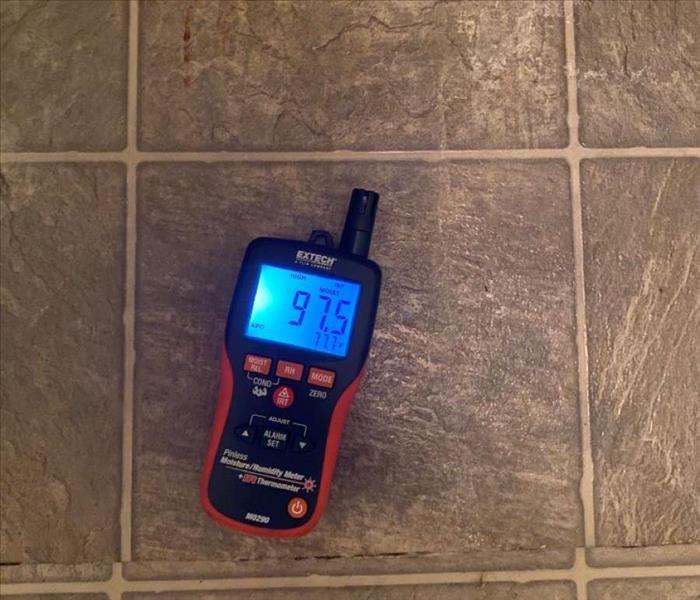 SERVPRO has the expertise and equipment and specialized sensors to mitigate water damage of any size.
SERVPRO has the expertise and equipment and specialized sensors to mitigate water damage of any size.
A leaking refrigerator/freezer in your home can happen for several reasons. If the defrost drain freezes, the water overflows the drain trough and drips down to the bottom compartment, eventually leaking onto the floor. The water tank assembly can also begin leaking. These leaks can be challenging to find, but a leaking tank requires replacement. Also, if you have a water dispenser and ice maker, the inlet valve can become loose or cracked, allowing water to leak.
SERVPRO can restore water-damaged Greenville homes. We have all the right tools for this, and our staff has been specially trained and certified.
When your home has suffered water damage, our goal is to return all the affected materials to their normal moisture content levels. We use moisture meters to find the actual moisture content of different materials to help us determine if your structure is dry. Penetrating moisture meters have probes to test inside wall cavities and underneath the flooring. Penetrating meters also test separate layers. Non-penetrating meters have sensors that do readings when placed on the surface of materials.
SERVPRO technicians must use the moisture meters properly. We ensure that the meter we are using is set to the surface we are testing. A moisture meter set for drywall, for example, does not accurately read moisture content in wood materials. The relative scale is used to determine readings for non-wood materials and the wood scale to determine readings for wood. If possible, we can establish a baseline of moisture content from material from an unaffected area of the structure.
We also use thermo-hygrometers to measure both the relative humidity and temperature. We let the meter adapt to air conditions in the room before taking the reading, then in conjunction with a psychrometric calculator or chart to figure out the specific humidity. Readings of air for four areas are used, including the areas unaffected, the areas affected by moisture outside the home, and the exhaust being processed through the dehumidifier into the affected area.
SERVPRO of Greenville has the tools to ensure that your home is thoroughly dry again after cleaning up the water damage. Contact us at (252)-329-7205.
Critical Maintenance for Your Water Heater
4/11/2022 (Permalink)
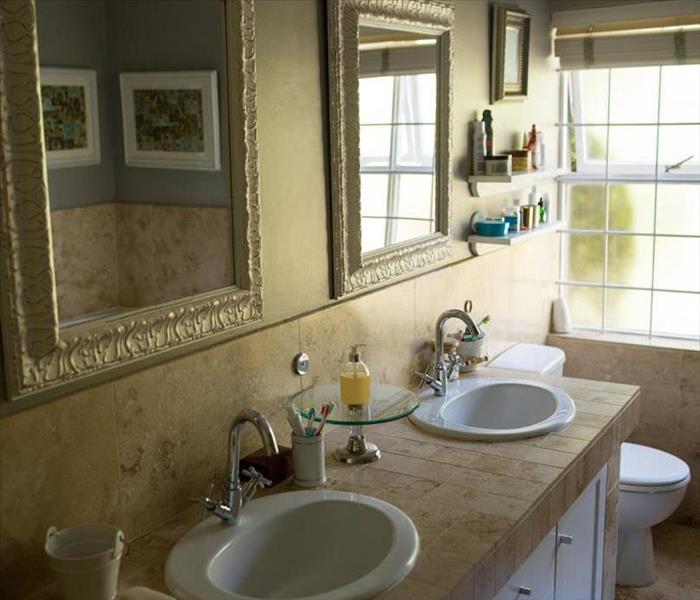 Know more about your Water Heater and Avoid Water Damage in your property.
Know more about your Water Heater and Avoid Water Damage in your property.
There are a lot of things to love about your water heater. For the most part, it is a no-fuss, no problem kind of appliance, giving your home in Greenville, NC, a reliable supply of hot water whenever needed. You can use this heated water for washing dishes and clothes, bathing and showering and shaving. Once the appliance is installed, it typically operates for years without a lot of maintenance.
However, to get the most out of your unit there is at least one important thing you can do on an annual basis. A water heater flush only takes a little time and has several important benefits:
- Gets rid of accumulated sediment in the bottom of the unit
- Prevents costly repairs and service calls to the home
- Avoids the premature failure of this essential home appliance.
- Reduces the chance you will need a professional water damage repair service
The Main Steps for Flushing Out a Water Heater
To begin with, assemble the necessary tools for the job, which you should have around your home. These include a garden hose, a screwdriver, work gloves and an area to drain the water. The next step is to turn off the heater. For gas heaters, this means extinguishing the pilot light and for an electric model, it means turning off the electric power to the unit, usually at the circuit breaker.
Next, find the drain valve at the bottom of the appliance and connect the hose to it. Then run the house out to a suitable area such as a grassy area in your backyard. Open the drain valve and let the water flow through the hose. Remember that the water coming out of the unit could be hot so be careful not to scald any exposed skin.
After the water has drained for a couple of minutes, go into the kitchen and turn on the hot water faucet. This helps the water flow more fully and allows for a more thorough cleaning of the inside of the heater. After about five minutes, turn off the water valve at the heater's base and watch until no more water is coming out of the heater. You can turn the valve on and off a couple of times for a good flush.
From there it is just a matter of removing the garden hose, closing the valve and turning on the energy source. The tank will again fill up with water and you will once again have the needed hot water for everyone in your household.
The Removal of Corrosive Sediment
If you never perform a hot water flush, either by yourself or by a plumber, sediments will settle into the bottom of your tank. In time, they can weaken the metal at the bottom of the tank enough that water will suddenly flow out to the interior of your house. This could result in gallons of water streaming over the carpet or other floorings.
Your water heater is part of what makes your home a castle. A little preventative maintenance helps this appliance have a longer life.
Prepare for a Visit From Your Home Insurance Adjuster After a Disaster
11/22/2021 (Permalink)
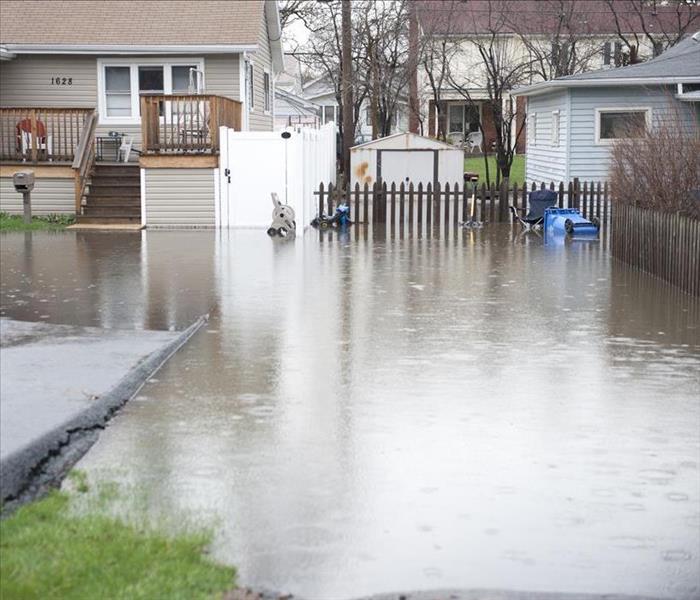 If your Greenville, NC, property is damaged, prepare a visit from your home insurance adjuster.
If your Greenville, NC, property is damaged, prepare a visit from your home insurance adjuster.
If your home sustains a disaster of any kind, a home insurance adjuster will have to visit your Greenville, NC, property. This experience can be anxiety-provoking, though. What should you expect? Will you receive the reimbursement you need from your claim? Your home adjuster will require some specific information about the damage so they can file the claim. There are several ways you can prepare for your insurance adjuster's visit to make the process operate as efficiently as possible for everyone involved.
Begin With These Steps
1. Contact the Insurance Company
First, you'll need to contact the insurance company and give them all the information about the disaster and the damage your home sustained. They'll schedule an appointment for the insurance adjuster to visit to assess the damage. They'll tell you exactly what to expect during the process, explain what is covered and what isn't, inform you of what the adjuster will need, and how you can mitigate damage in the meantime.
2. Photograph All Damage
After a disaster, things can change significantly from one moment to the next, so you should take pictures of all the damage as soon as possible. Capture detailed photographs of as much as you can safely obtain.
3. Make Temporary Repairs
Don't make any changes or repairs before the adjuster's visit unless absolutely necessary to avoid more damage (e.g., tarping a damaged roof to keep more rain and debris from getting in). The insurance company will want you to mitigate the damage if it's an emergency situation, but not anything that can wait without getting worse. Either way, take detailed photos before you do anything.
4. Review Your Homeowners Insurance
Review your homeowners insurance policy so you can be familiar with what is covered and what isn't. You can also prepare yourself with more questions for the home adjuster during the visit.
5. Become Familiar With the Claims Process
Take some time if you can to become more familiar with how the claims process works. The adjuster may offer you a settlement check on the day of the visit. If they determine that there is more damage than initially thought, you may get another check later.
6. Complete Claim Forms
If you can complete the insurance claim forms before the visit, it can be beneficial. Your insurance company may allow you to fill them out and submit them online.
7. Keep All Documents Associated With the Claim
Make sure you keep all the information associated with the disaster and the claim in one file so you can have them at hand when you need them. This file should include insurance company information, damage photos, contact information, repair estimates, bills, and receipts. You should also have detailed work information from storm damage remediation experts or similar professionals in this file.
When your home gets damaged, whether by a storm, fire, or another disaster, it's essential to get the insurance claim process underway immediately. This will allow you to obtain your settlement money quicker to begin repairs. Consider these tips to be better prepared for a visit from your home adjuster.
A Pipe Burst Has Flooded My Hardwood Floor! Now What?
10/12/2021 (Permalink)
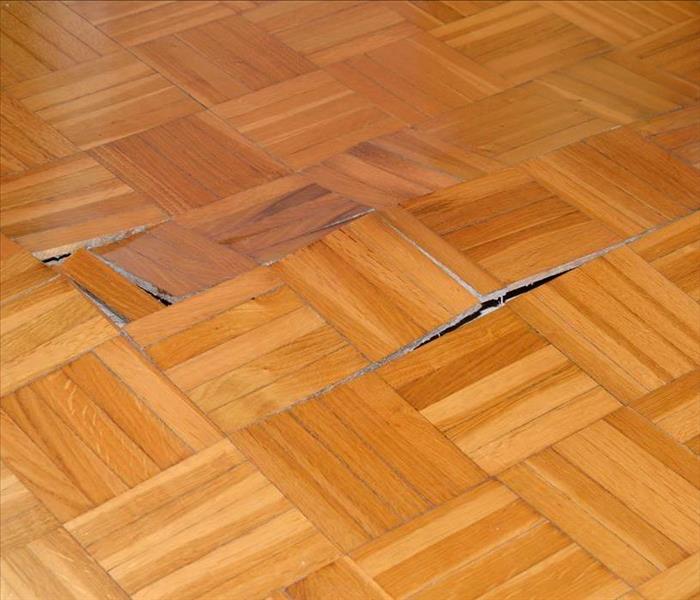 Hire water professionals to avoid mold damage after a pipe bursts in your Greenville, NC, commercial.
Hire water professionals to avoid mold damage after a pipe bursts in your Greenville, NC, commercial.
If your Greenville, NC, commercial building has hardwood floors, a burst pipe could be tragic. Depending on the amount of water, it may or may not be salvageable. There is hope, however. You can take some simple steps that will give you the best chance of saving most, if not all, your floor. Being proactive and learning them ahead of time may one day mean the difference between some light repairs and total tear-out.
Steps for Drying a Wood Floor
1. Extract the Standing Water
The most efficient way to remove the standing water is with a wet/dry vacuum. Use a squeegee to pull the water towards the vacuum hose to get it up quicker. If you don't have a wet/dry vacuum available, a mop or towels will do the job.
2. Clean and Disinfect the Floor
Wash the floor with a gentle soap and disinfectant solution mixed with warm water. Scrubbing the floor and baseboards with a stiff brush, cleaning as much dirt and organic material away as possible can help prevent mold growth. Mold spores are virtually everywhere. However, mold needs a food source to survive and grow. The mold spores already there will have less opportunity to grow into a full-blown mold infestation on a clean, sanitized floor.
3. Look Out for Mold
Hiring water damage restoration professionals is highly recommended after a pipe burst to inspect for and get rid of mold. They have the expertise and industrial equipment to ensure the mold is completely gone as quickly as possible and won't come back. However, if you opt to tackle this task yourself, use a mold killer such as trisodium phosphate and a stiff brush to scrub away mold or any suspect discoloration. Contrary to popular belief, you should NOT use bleach; it will only temporarily remove the mold. Finally, after cleaning it thoroughly, rinse the area with clean water (and a damp cloth; don't pour the water on the floor) and dry it immediately. Then, inspect the area for signs of mold and additional water damage.
4. Dry Everything Thoroughly, Yet Steadily
Now, it's essential to dry the floor thoroughly, but wood flooring must be dried steadily and not too fast; otherwise, it can crack. Mold can take hold quickly, beginning growing within 24 hours of water exposure. If the outdoor humidity is lower than the indoor humidity, you can open doors and windows to enable the fresh air to flow through the space. You can also run fans and dehumidifiers.
An influx of water from a pipe burst is never a good thing. When you have a wood floor, it can rise to a whole new level of severity. Hardwood floors are beautiful, but they also take more maintenance and care than other types of flooring. Although a hardwood floor will probably sustain some irreparable damage, there are ways to combat the severity loss if you quickly begin the wet floor cleanup process. After an influx of water, time is not on your side; every second counts in preventing additional loss. Knowing how to deal with this situation in advance can be a tremendous help should the situation arise.
How To Repair a Leaking Faucet
9/24/2021 (Permalink)
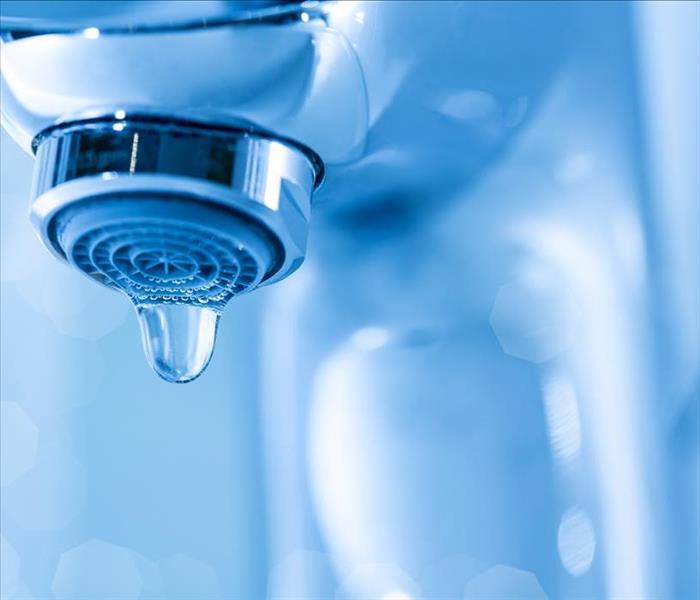 Repair a leaking faucet to avoid water damage in your Greenville, NC home.
Repair a leaking faucet to avoid water damage in your Greenville, NC home.
A leaking faucet is a much larger problem than the annoying drip you hear at night; the consistent loss of water can hit you in the wallet every month. The good news is that fixing that dripping faucet is a pretty straightforward task that you can complete before it's necessary to contact a Greenville, NC, water damage cleanup and repair company.
Four Common Leaking Faucet Repairs
No matter which type of faucets you have in your home, turn the water off before you begin this repair. Check under your sink for a turn-off lever or knob. Turn the knob clockwise and then check the faucet to be sure the water is off. It's also a good idea to close the sink plug, so you don't lose any small hardware in the drain.
1. Ball Faucet: Single Handle That Moves On an Internal Ball
This type of faucet is most common in kitchens and is a bit complicated because it has a lot of parts to remove and replace. Rather than buying the parts separately, check your hardware store for a faucet kit. Begin by removing the handle; it should unscrew fairly easily. Use a pair of pliers to remove the cap, collar, faucet cam, washer, and ball. You'll need a slender tool, such as a pair of needle-nose pliers, to remove the inlet seals and springs from inside the faucet. Before replacing the O-rings, coat them with a plumber's grease. Replace the springs, valve seats, and cam washers with parts from the kit as you reassemble the faucet.
2. Cartridge Faucet: One or Two Handles Next to the Faucet
Look for a screw on the handle or handles and remove it; then remove the handle(s). Use pliers to remove the threaded retaining clip, if it's present. Pull the cartridge up and out of the faucet. Remove the exposed spout and then look for the O-rings. Remember to coat the new rings with the plumber's grease before installing the replacements.
3. Compression Faucet: Two Handles on Either Side of the Faucet
This is the oldest type of faucet. Start by removing the handles on either side of the faucet. Plastic caps may cover screws that need to be loosened. Next, remove the nut, O-ring, and seat washer. Most of the time, this rubber washer is the source of the leak. Regular wear and tear can affect the washer until it is too damaged to be effective. Before installing the new washer, coat it with plumber's grease
If water is seeping from the handles, rather than a leaking faucet, the O-ring is probably the problem. When this is the case, you'll need to take the O-ring to the store, so you can pick the right replacement.
4. Disk Faucet: Single Lever over a Cylindrical Body
This modern faucet doesn't require repairs very often. Begin by unscrewing the handle to expose the escutcheon cap. Remove this, unscrew the disk cylinder, and remove the exposed seals. Clean the cylinders to remove all hard water buildup. Replace the seals with exact replacements and reattach the rest of the handle.
As soon as you notice a leaking faucet in your home, take steps to repair it. A successfully fixed leak can save you a lot of money in wasted water and potential water damage.
Faster to your Greenville Water Damage
9/20/2021 (Permalink)
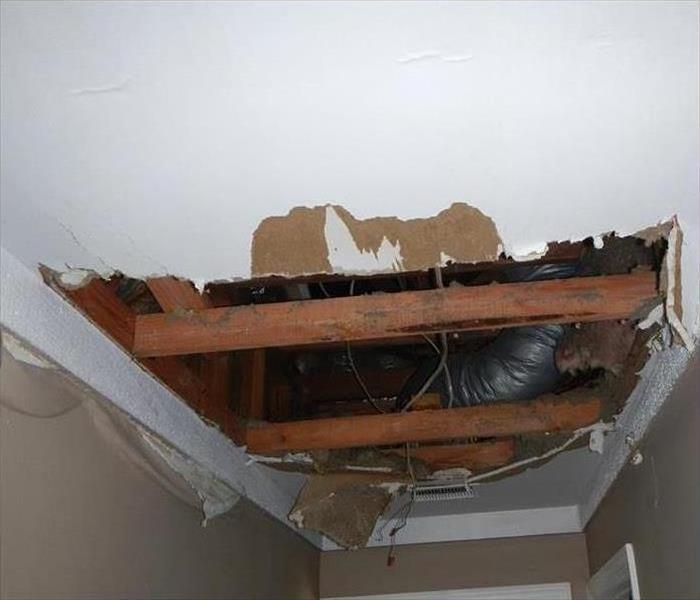 SERVPRO provides 24 Hour fire and water damage restoration service in Greenville, NC.
SERVPRO provides 24 Hour fire and water damage restoration service in Greenville, NC.
Flooding and water emergencies don’t wait for regular business hours and neither do we. SERVPRO of Greenville, NC provides emergency cleaning and restoration services 24 hours a day, 7 days a week—including all holidays.
Faster To Any Size Disaster
Flooding and water damage are very invasive. Water quickly spreads throughout your home and gets absorbed into floors, walls, furniture, and more. SERVPRO arrives quickly and starts the water extraction process almost immediately. This immediate response helps to minimize the damage and the cleaning and restoration costs.
Water Damage Timeline
Within Minutes
- Water quickly spreads throughout your property, saturating everything in its path.
- Water is absorbed into walls, floors, upholstery, and belongings.
- Furniture finishes may bleed, causing permanent staining on carpets.
- Photographs, books, and other paper goods start to swell and warp.
Hours 1 - 24:
- Drywall begins to swell and break down.
- Metal surfaces begin to tarnish.
- Furniture begins to swell and crack.
- Dyes and inks from cloth and paper goods spread and stain.
- A musty odor appears.
48 Hours to 1 Week:
- Mold and mildew may grow and spread.
- Doors, windows, and studs swell and warp.
- Metal begins to rust and corrode.
- Furniture warps and shows signs of mold.
- Paint begins to blister.
- Wood flooring swells and warps.
- Serious biohazard contamination is possible.
More Than 1 Week:
- Restoration time and cost increase dramatically; replacing contaminated materials and structural rebuilding may be extensive.
- Structural safety, mold growth, and biohazard contaminants pose serious risks to occupants.
About SERVPRO of Greenville, NC
SERVPRO specializes in the cleanup and restoration of residential and commercial property after a fire, smoke, or water damage event. Our staff is highly trained in property damage restoration. From initial and ongoing training at SERVPRO’s corporate training facility to regular IICRC-industry certification, rest assured our staff is equipped with the knowledge to restore your property.
Moisture in your Greenville, NC home or business
9/13/2021 (Permalink)
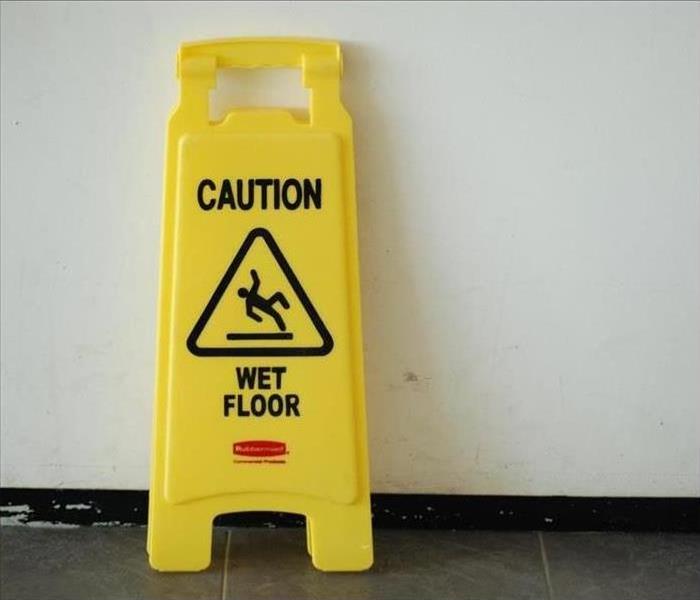 Excess moisture can be dangerous to your home and health.
Excess moisture can be dangerous to your home and health.
Moisture in older homes
Older structures in Greenville, NC homes, are more susceptible to moisture after heavy rain, meaning water can sometimes seep in or leak where it shouldn’t be. In small doses over wide intervals, it may not do any noticeable damage, but if the issue occurs more frequently and is left untreated your home or business may receive permanent water damage. Enlisting experts like your locally owned and operated SERVPRO can help to eliminate this problem and save you considerable time and money in the long run.
Getting you dry
Our professionals can help you immediately by using specialized equipment to extract water and dry the affected area. Our equipment can get underneath the surface of carpets and into the padding, eliminating moisture all the way through. We can also help you in the long run by cleaning the structure and contents with our safe, effective sanitizing treatments. These preventative measures keep unwanted growth away and prevent materials from swelling or corroding.
Verification
To further give peace of mind, we check under your crawlspace (if applicable) to make sure no further damage has occurred. We also check your subflooring and inspect the layers of your carpeting and padding to verify our extraction methods have fully dried out the affected area. Lastly, we will test the humidity to ensure it is in an acceptable range, indicating that moisture levels are low enough to prevent secondary damages. Once completed, we can walk through with you and explain what we did, how we did it and of course answer any other questions you may have.
8 Water Conservation Tips for Your Business
8/16/2021 (Permalink)
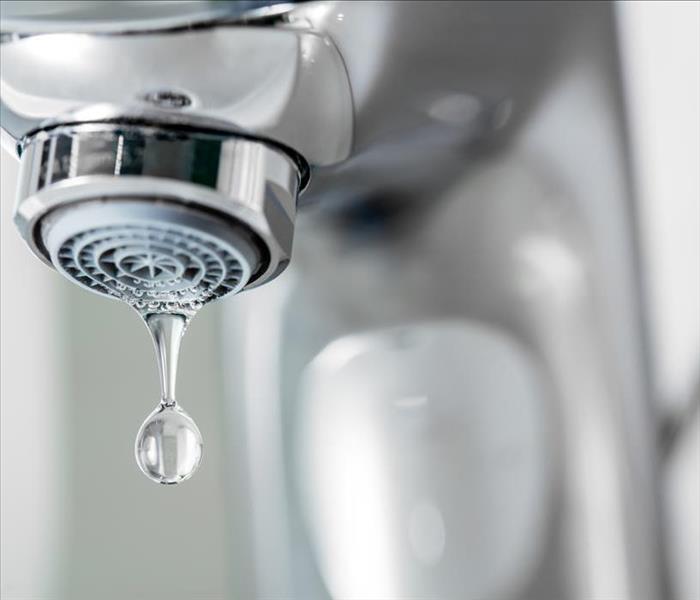 Water is a resource fundamental for our lives. Repair the leaks to conserve the life and your building's septic system in Pitt County, NC.
Water is a resource fundamental for our lives. Repair the leaks to conserve the life and your building's septic system in Pitt County, NC.
Water is an essential resource that's becoming more finite as time passes. Now is the time to begin conserving water if you haven't already started. Conserving water has many benefits, including protecting the environment from various water issues such as pollution. It can also save your business money on your Pitt County, NC, utility bill and by extending the life of your building's septic system.
1. Repair Leaks
Investigate drippy faucets and leaky pipes. These can potentially waste up to thousands of gallons of water each year. Monitor faucets, pipes, toilets, appliances, and other fixtures for leaks and drips and repair them immediately.
2. Educate Employees
When you're trying to conserve water for the environment and your business's water bill, everyone needs to be on board. Make sure to train your employees on water conservation techniques and procedures. In addition, everyone should stay up to date on the latest water-efficient technology to keep at maximum usage efficiency.
3. Keep Extra Drinking Water in the Refrigerator
Instead of leaving the tap water running until it cools off, have a couple of extra reusable water bottles to put tap water in to keep in the refrigerator. It'll be cold and refreshing when you're ready to drink it, and it'll conserve water in the process.
4. Reuse and Recycle the Water
There are several options for reusing and recycling water. These options include purifying processes and harvesting rainwater. Harvesting rainwater requires various research with environmental agencies. You can also reuse gray water if you have the proper recycling methods at your building. Reusing gray water can make a significant difference in your water usage and utility bill.
5. Install Water-Efficient Equipment
Purchasing water-efficient equipment for your building can be an excellent investment. If you already have a water filtration system, make sure you keep all parts and equipment current and working correctly. This will keep your system working efficiently, conserving water and saving money.
6. Upgrade to Smart Metering Technology
These days, there are smart technology options for automated and advanced meter reading. This technology can measure and monitor your building's water usage as it links multiple operating systems in the building management system. This water upgrade can also keep you aware of any water issues that might occur.
7. Don't Use Toilets as Trash Cans
Toilets are only designed to flush human waste and toilet paper. When you use it to flush other trash, such as paper towels or cigarette butts, it can risk stopping up the line and causing an overflow, requiring a visit from a plumber and water damage restoration professionals. Additionally, every time you flush, you use at least two gallons of water, depending on the model of the toilet. Make your employees and customers aware of this, also.
8. Insulate Water Pipes
Insulating your water pipes is easy and helps conserve water. In those colder months, water will heat up much quicker, so you don't have to waste water waiting for it to get hot. Purchase some foam pipe insulation; you can even purchase it pre-slit and ready to slip on the pipes with ease.
Implementing a water conservation plan into your business has several benefits for the environment and your bottom line. As the world faces shortages and other water issues, it's rewarding to do your part to help save water.
How Restoration Services Help With Disaster Recovery
6/28/2021 (Permalink)
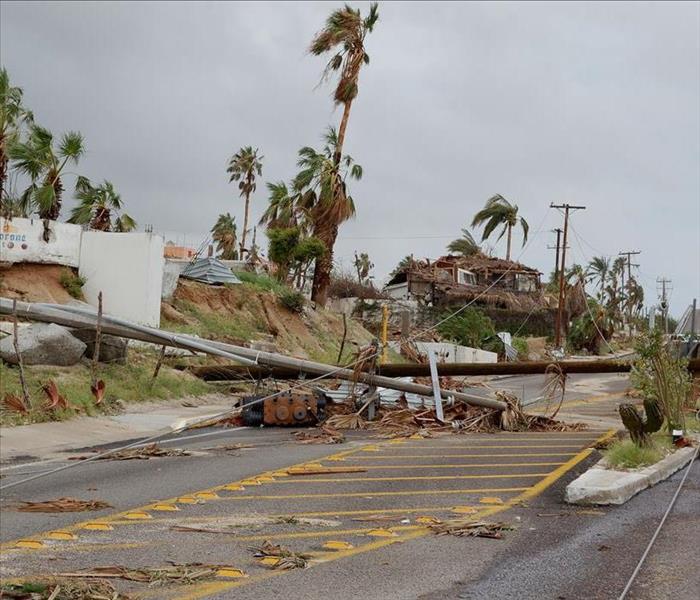 A large storm may cause severe damage.
A large storm may cause severe damage.
Whenever there is a large storm, it takes coordination of efforts from a variety of professionals, including insurance adjusters, restoration companies, building contractors and others to help homeowners recover. Restoration service companies play a valuable role in disaster recovery.
3 Ways Restoration Services Help With Disaster Recovery
1. Temporary Repairs
Because large storms can cause storm damage to many homes and businesses in the Greenville, NC, area at the same time, it may take days or even weeks for contractors to make permanent repairs to damaged homes. Restoration companies offer services, such as tarping, that can help prevent additional damage from occurring while the homeowner waits for permanent repairs. In most cases, insurance policies will cover the cost of temporary repairs that are necessary to prevent additional damage from occurring to the home or its contents.
2. Mold Growth Prevention
One of the most common problems that result from homes affected by large storms is mold growth. The reason for this is that these storms can leave many homes with standing water from floods or rain that enters the home through damaged roofs and windows. Restoration companies can help prevent mold problems by quickly drying out affected properties and cleaning and sanitizing surfaces as part of the disaster recovery effort.
3. Insurance Claims
Restoration companies work closely with insurance companies every day. Systems are already in place to help homeowners get their claims processed quickly. Additionally, many companies have a network of franchise locations that can be mobilized to provide additional storm response for areas affected by a major storm. Utilizing a restoration company can reduce the burden on homeowners and claims adjusters by speeding up the process of getting claims approved and beginning the restoration of their homes.
Hundreds or even thousands of people may be involved in disaster recovery efforts after a major storm event. Restoration companies play a critical role in preventing unnecessary damage and helping homeowners get on the road to restoring their homes to preloss condition.
What Are the Three Types of Flood Water?
4/30/2021 (Permalink)
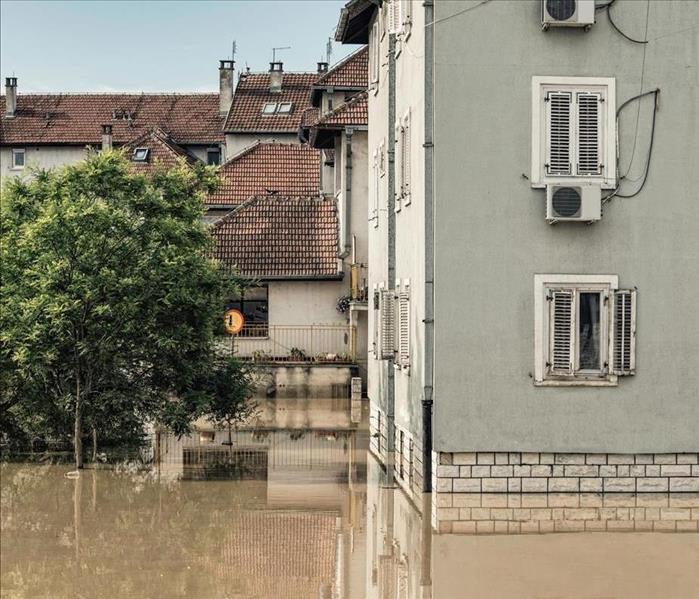 Flooding can cause severe water damage
Flooding can cause severe water damage
When floodwaters enter your Greenville, NC, home, whether from a broken supply line, toilet overflow or flooded river, one thing is for sure: the water will cause damage. The difference is the type of cleanup required based on the incoming water's classification and if it's severely contaminated water or not.
3 Types of Flood Water
There are three classes:
1. Category 1
White water (aka clean water) is safe to handle because it is from a reasonably sanitary source. It could be rainwater, a leak from a clean toilet, or a pipe burst. This water doesn't require protective gear or strict precautions to clean up. However, it needs to be removed and dried as quickly as possible; mold can begin growing within 24 hours.
2. Category 2
Gray water is somewhat contaminated water. You'll need to take some care when cleaning this water, as it contains biological or chemical contaminants that could be harmful but not likely toxic. Water from aquariums, showers or washing machines can contain matter such as bacteria, detergents, urine or blood. Hence, it's essential to wear protective gloves while cleaning and keep children and pets away from the affected area.
3. Category 3
Black water is particularly hazardous because there's a high probability that it contains many harmful biological and/or chemical contaminants. This type of water comes from conditions like raw sewage or natural disasters. You might be surprised to find out that freshwater and ocean water are also classified as category 3. This is due to the countless unknown contaminants. Category 3 water cleanup should only be handled by water damage restoration professionals to ensure proper safety precautions by experts.
Whatever the class of contaminated water in your home, the affected area must be cleaned and dried thoroughly to avoid further damage. The more prolonged dampness is left to linger in your home, the more loss it'll sustain. Taking the necessary cleaning precautions will ensure the well-being of your family, property and home.
When to Have Water Restoration in Greenville, NC
10/26/2020 (Permalink)
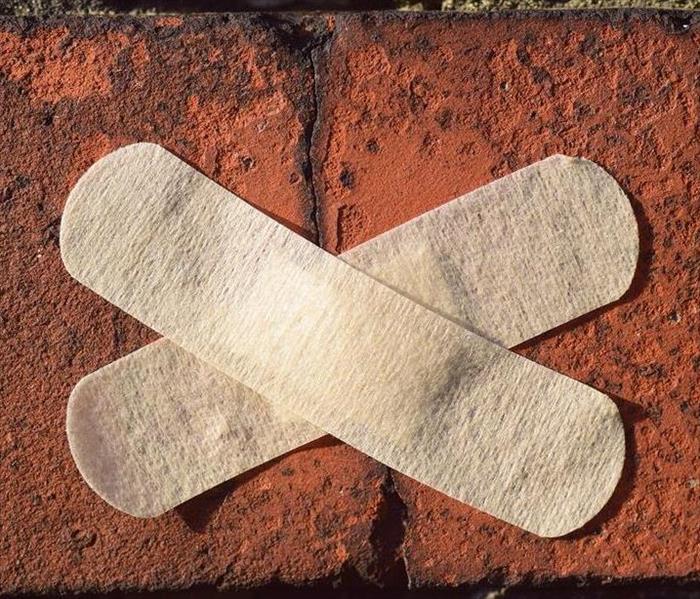 Trust the professionals at SERVPRO to fix your home or business after a water damage.
Trust the professionals at SERVPRO to fix your home or business after a water damage.
Water Damage Repair is More Successful the Quicker it Takes Place – Call SERVPRO to Your Greenville, NC Home As Soon As Possible
A leaking water supply line isn’t always immediately obvious. The longer it takes to notice, the more time it has to damage its surroundings. This often requires professional intervention. If you suspect there may be hidden water damage in your Greenville, NC home, give the IICRC Certified technicians at SERVPRO of Pitt/Greene a call. Waiting only allows water more time to cause secondary damage and potentially allow for mold and mildew to sprout. In other words, if you suspect water, don’t wait! We offer emergency water extraction and repair services seven days a week, 24 hours a day, to give you added peace of mind.
Sometimes water damage is unavoidable, such as flooding from excessive rain. However, some water events can be stopped in their tracks by merely updating your water-run appliances, maintaining your plumbing, and doing scheduled checks.
What to do in an Emergency?
Until the time that our technicians arrive at your property, it helps to have the water supply turned off to any suspected areas where the water could be coming from. This keeps water from further flooding the entire space. If you are unsure of the easiest and safest way to turn off the water to that one location, you can try to shut off the incoming water supply to your home.
You can also help minimize damage until a crew arrives by utilizing a few useful tips, such as:
- Opening up windows to get airflow to the impacted area
- Trying to carefully ventilate the space to keep relative humidity levels low
- If possible, you can cordon off the water incident zone from other rooms in the house. You can do this by shutting doors, putting down a blanket or towel, and keeping family and pets from going in and out.
How Does SERVPRO Take Care of Cleanup?
When you contact us for water damage repair, one of our technicians will assess the situation. Removing any standing water is necessary to move on to drying and dehumidification. In most cases, we will do our best to restore your home instead of simply removing everything that has been affected and replacing it later. This can include cleaning and restoration of your furnishings, personal belongings, and any salvageable structural materials. Our technicians take the necessary time to assess each area within the impact zone so that we never leave any moisture behind. Hidden pockets of moisture hinder the cleanup process and leave the door open for microbial growth. In some situations, controlled demolition is necessary to remove damaged materials to be replaced by all-new materials.
Why Controlled Demolition?
Whenever water saturates building materials, there is always a chance that they can become compromised. Soaked drywall, warping floorboards, and soggy insulation are all areas that can quickly get addressed with our controlled demolition practices. We work fast to ensure your interior is left “Like it never even happened,” so that you and your household can get back to your normal routine as quickly as possible.
How Does Drying Work?
There may be water intrusion incidents where we have to perform pack-out services to store or clean your belongings off-site. This helps us to maneuver during the repair work and to utilize our drying and dehumidification equipment to their fullest potential. We use the latest Advanced Structural Drying (ASD) techniques, ensuring to look for water that may have migrated under flooring, behind walls, and baseboards. Our trucks come loaded with tools and equipment that allow us to achieve our goals fast, such as:
• Centrifugal air movers and industrial fans
• Moisture detection tools such as sensor, meters, and thermal imaging cameras
• Commercial grade dehumidifiers
Once your cleanup and repair project is complete, there are some things that you can do to hopefully avoid such a catastrophe in the future, including:
• Inspections, checks, and maintenance of your water-run appliances and plumbing
• Updating water heaters and other appliances to help avoid breakdowns
• Noting any sudden changes in water pressure or your water bill
• Remaining mindful of any musty odors or discoloration that develops of walls or ceilings
Of course, even with proper preparation and planning, water damage can still strike unexpectedly. If you are ever in need of our professional services, give SERVPRO of Pitt/Greene counties a call at: (252)-329-7205.
What Is Removed After A Water Loss?
10/12/2020 (Permalink)
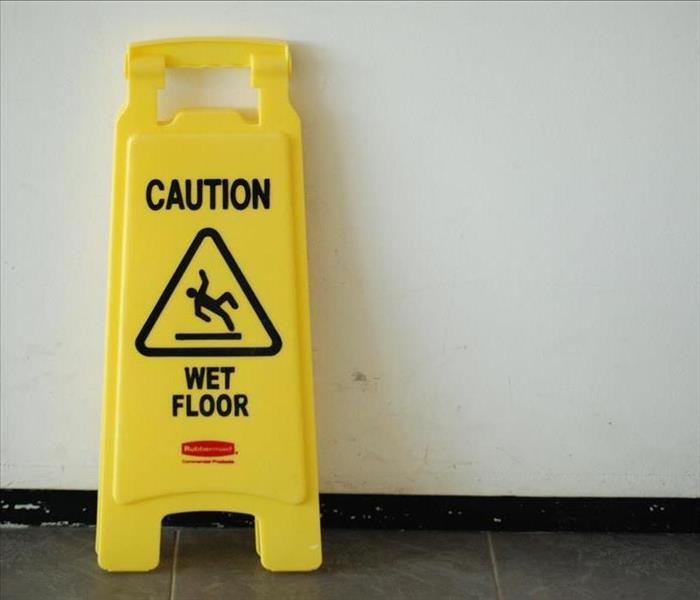 Trust the IICRC Certified professionals at SERVPRO to take care of your water damage remediation needs.
Trust the IICRC Certified professionals at SERVPRO to take care of your water damage remediation needs.
Be it just a leak in a supply line or thousands of gallons rushing through your home or business, having a water loss can be incredibly frustrating. Most water damages are something between these extremes, but regardless of the amount, water can damage most building surfaces with prolonged exposure. Drywall, sub-flooring, particle board, even hardwoods can act like a sponge and absorb large quantities of moisture, causing them to swell and warp. If such deformation occurs, the affected materials don’t return to shape or maintain their original structural strength.
Materials that hold moisture for long periods of time are also much more likely to grow mold. These are a few reasons such materials might need to be removed.
Carpet pad often has a vapor barrier built in to it, and once excess water becomes trapped under such a pad, it must be removed for the subfloor to dry and not become further damaged. When dirty water comes in contact with carpeting and pad, drywall, or wood/engineered wood, the materials are generally removed due to gross contamination and material damage.
The crew at SERVPRO of Pitt/Greene Counties know when materials can be saved and when they must be removed. Allow us to explain the drying process and to assist you every step of the way. Your home will be left dry, decontaminated and ready for repair. Give us a call at 252-329-7205 when water invades your home or business.
How SERVPRO Can Help New Bern Residents With Water Damage
3/30/2020 (Permalink)
Regardless of the size, water damages can impact the structure and air quality of affected homes and buildings over time. Handling every water related issue quickly and seriously can save you from much larger expenditures and frustrations in the long run. The trained IICRC Certified Technicians of SERVPRO of Craven/Pamlico have the knowledge and equipment to find and take care of moisture before more extensive damages occur.
Our crews are on standby 24/7 and will respond to your call with rapid response and the appropriate equipment when needed. Some of the equipment we use can make a tremendous difference, depending on your needs.
Armed with Moisture Sensors, our technicians can detect moisture in carpets, baseboards and walls that have no visible signs of damage.
Moisture Meters are a favorite go-to, used to determine the actual moisture content of various materials to determine if further drying efforts are necessary. The moisture tester provides accurate readings, allowing SERVPRO Professionals to monitor the drying process.
Thermo Hydrometers measure the temperature and relative humidity of targeted areas. This information enables SERVPRO Professionals to calculate and create an environment that is the most efficient for drying. Many types of water losses include contaminated water. This not only requires drying efforts, but typically disinfection and deodorization processes as well.
One of the best ways to achieve this is with our Fogger machines. These mighty little machines can be used to help deodorize as well as disinfect a wide variety of items and places, such as delicate upholstery and clothing to large structures and vehicles where there may be some areas that are difficult to get to otherwise.
For the technology, training and rapid response you can rely on, give us a call at (252)-637-7274 so we can make it "Like it never even happened."®
What To Expect After A Water Damage in Greenville, NC
2/7/2020 (Permalink)
 Flooding is just one of the many ways water damage can occur.
Flooding is just one of the many ways water damage can occur.
Understanding how quickly water damage can turn from a problem to a nightmare is imperative to responding appropriately.
The first hour of a water damage can quickly saturate walls, furniture, personal items and anything else that might be in its path. The finish from your furniture can bleed onto carpets, likely permanently damaging them. Even if furniture isn’t nearby, many carpets can bleed their own dye out, running the risk of staining other parts of the material or other objects on or near them. Any paper-based belonging such as photos and books will wick up the moisture, swell and warp.
Within the first 24 hours, serious degradation to items such as metals can occur, leading to rust and tarnish. Drywall tends to absorb water and swell, causing it to breakdown. Wood swells and cracks and musty odors begin to form.
Within the first week, even more robust metals and woods begin to corrode and deteriorate. Doors, windows and structural components such as joists and studs begin to swell. Paint begins to bubble and blister on walls and serious warping can form on hardwood flooring. Mold and mildew begin to show visible signs, especially on upholstered goods. Health risks and major bio-hazard contamination is possible.
After a week of untreated water damage, remediation efforts become significantly more expensive and time consuming. Most everything at this point is contaminated and likely needs replaced. Serious structural rebuilding and mold remediation are probable for safety.
Protect Your Greenville, NC Home From Water Damage
6/3/2019 (Permalink)
Water damage can seem like an unlikely consideration to those outside of flood planes or in areas with low annual rainfall amounts. Yet, even in drier, arid environments, flood damages are still common. Unlikely as it may initially seem, there is an explanation that relates to homes across the United States—our water supply lines.
These supply lines are thin hoses typically connecting our dishwashers, toilets, washing machines, refrigerators, water heaters and more. Just as the quality of these products vary, so too does the quality of the supply lines. Many suppliers opt for cheaper lines which may in turn be less reliable for the end user. These lines should be checked regularly for damage or any indication of a leak. Even if there are no apparent damages or signs of a leak, these lines can still burst from aging. So regardless of apparent condition, replacing the lines on a regular schedule could save you considerable time and frustration over the long run.
If you have never replaced your supply lines or it has slipped off of your regular maintenance schedule, strongly consider doing so soon. When you do replace your lines, be sure to look for a high quality line to give you some peace of mind.
Of course, even with thorough preparation and maintenance, water damage is still possible. If your property has had water damage of any kind, the expert technicians at SERVPRO of Pitt/Greene can help you get back to preloss conditions.
For additional information about our services, give us a call today at: (252)-329-7205
Greenville, NC Residents, Let us Take Care of your Flooded Business or Home
2/6/2019 (Permalink)
Dishwashers are a convenient and quick way of handling a dirty task. As much as they may be appreciated, they can cause some unexpected problems such as a leak in the middle of the night. This could leave your Greenville, NC business or house in dire need of water extraction and clean up that may be beyond your means of handling. The water damage remediation experts at your locally owned and operated SERVPRO® are more than equipped to handle such a situation.
Our experts know that the longer water remains on an effected area, the more damage it can cause. This knowledge is critical and motivates our crews to get your home or business taken care of as quickly as possible. Our crews are prepared to respond to an emergency water damage situation 24/7, giving you peace of mind that whenever you might need us, we are #HereToHelp.
Our crews are also equipped with advanced tools to determine where moisture is present and then remove it. One of these tools—an extractor—can simultaneously remove water while also applying heat to help dry the space it is extracting water from. We also have pumps if there is larger pools of water, and of course, the materials we need to cleanse and sanitize any affected areas.
Give us a call whenever you need us at: (252)329-7205 and we will be more than happy to make your damage "Like it never even happened."®
Getting and Keeping Greenville NC Residents Dry
12/28/2018 (Permalink)
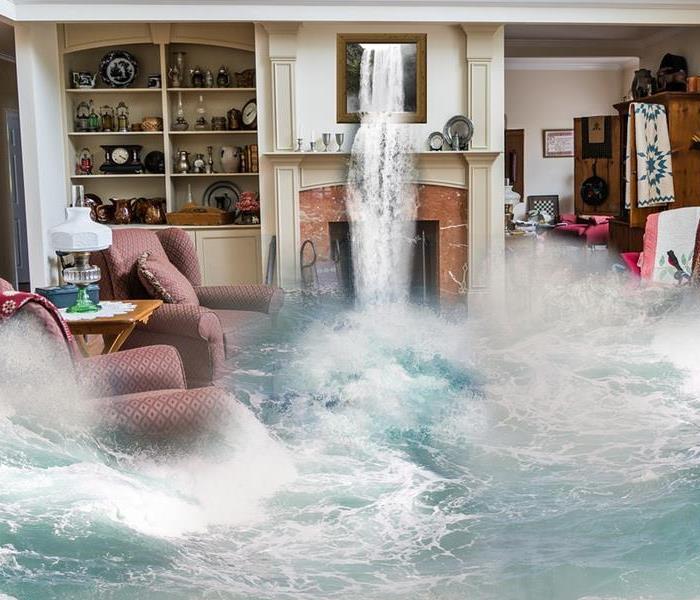 Even If you find yourself up to your knees in water, we here at SERVPRO are ready to help
Even If you find yourself up to your knees in water, we here at SERVPRO are ready to help
From a leaking roof to a dishwasher gone awry, water damage can occur in nearly any home, at any time. While we can try our best to prepare for these potential hazards, sometimes damage is inevitable. Unfortunately, depending on the source of the water, this can often lead to our most precious items—the things that make our house a home—becoming damaged. That's where we here at SERVPRO come in. We are well-equipped and ready to help in any situation, including getting those sentimental items back in the best possible shape.
If you or someone you know finds themselves needing professional cleanup & restoration services, the compassionate experts you can trust at SERVPRO® of Pitt/Greene counties are Here To Help® 24/7 at 252-329-7205. #LikeItNeverEvenHappened #HereToHelp




 24/7 Emergency Service
24/7 Emergency Service

















